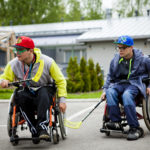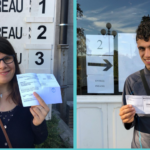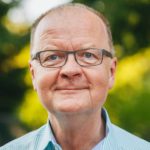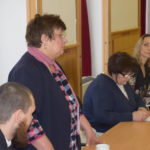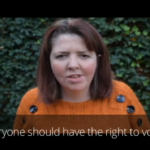[:de]EPSA members have met in Peniche.
Peniche is a town in Portugal.
At the meeting, they talked about different things.
These are some of the things they talked about:
- They talked about the Life after violence project.
The project is about violence in institutions.
Women with disabilities are often the victims.
Juultje Holla told EPSA members about the project.
Juultje is a researcher from the Netherlands
who works on the project.
EPSA members talked about the violence they know
They also talked about what to do when they see violence happening.
They heard about how the police in Portugal has been trained by self-advocates
to better deal with violence against people with intellectual disabilities.
- EPSA members also talked about the Global Self-advocacy summit at the World Congress.
For the summit, EPSA needs to prepare some calls to action.
A call to action is when you ask someone to do something
to make things better.
You first tell them where a problem is.
And then you tell them what they can do
to help you solve the problem.
EPSA members talked about some problems:
– Many people with intellectual disabilities in Europe
cannot get an inclusive education.
– Sometimes teachers do not know how to teach children
with intellectual disabilities.
– Brothers and sisters of people with intellectual disabilities
need more support.
– Parents also need more support.
–
EPSA members will choose some of the problems to do calls for action.
They will write about the calls for action.
This will be ready for the Global Self-advocacy summit.
- EPSA members also talked about the General meeting of EPSA in May.
At the EPSA General meeting members will talk about the work they have done.
They will also talk about the European elections.
The elections for the European Parliament will be next year.
EPSA will contribute to Inclusion Europe manifesto for the European elections.
EPSA members will use the calls to actions to prepare the manifesto.
- They also talked about which self-advocate should represent Europe
at Inclusion International.
At the moment, it is Sara Pickard.
Sara Pickard is a self-advocate from the United Kingdom.
Sara Pickard said she would like to continue doing this job.
The EPSA members agreed that she should remain the European representative.
In Birmingham, self-advocates from Inclusion International can elect Sara.
The European representative will take part in all EPSA meetings and events from now on.
At the meeting, Harry Roche was interviewed by a local radio station.
The radio station is run by self-advocates.
Harry Roche is a self-advocate from the United Kingdom.
He is also on the board of Inclusion Europe.
Participants really liked being in Peniche.
They found the meeting useful.
[:en]

Click on a word which is in bold to read what it means.
Self-advocates from EPSA have met in Peniche.
Peniche is a town in Portugal.
At the meeting, they talked about different things.
Here are some of the things they talked about:
- They talked about the Life after violence project.
The project is about violence in institutions.
Women with disabilities are often victims of such violence.
Juultje Holla and Ellis Jongerius told EPSA members about the project.
Juultje is a researcher from the Netherlands who works on the project.
Ellis Jongerius is a self-advocate.
She helps Juultje with the research.
EPSA members talked about different kinds of violence.
They also talked about what to do when they see violence happening.
They heard about how the police in Portugal have been trained by self-advocates
to deal with violence against people with intellectual disabilities.
- EPSA members also talked about the Global Self-Advocacy Summit at the World Congress.
EPSA is preparing some calls to action that can be shared at the summit.
A call to action is when you ask someone to do something to make things better.
In a call to action, you tell them about a problem.
Then you tell them what they can do to help you solve the problem.
EPSA members talked about some problems:
- Many people with intellectual disabilities in Europe
cannot get an inclusive education.
- Sometimes teachers do not know how to teach children
with intellectual disabilities.
- Brothers and sisters of people with intellectual disabilities
need more support.
- Parents need more support.
EPSA members will make calls to action about some of the problems they have talked about.
- EPSA members also talked about their General Meeting in May.
At the EPSA General Meeting members will talk about the work they have done.
They will also talk about the European elections.
The elections for the European Parliament will be next year.
Inclusion Europe is writing a manifesto for the elections.
EPSA will contribute to Inclusion Europe’s manifesto.
EPSA’s calls to action will be used to help make the manifesto.
- They also talked about which self-advocate should stand for Europe at Inclusion International.
This person is called the European representative.
At the moment, the European representative is Sara Pickard.
Sara Pickard is a self-advocate from the United Kingdom.
Sara Pickard said she would like to continue doing this job.
The EPSA members agreed that she should remain the European representative.
In Birmingham, members of Inclusion International can elect Sara to continue her role.
From now on, the European representative will take part in all EPSA meetings and events.
At the meeting, Harry Roche was interviewed by a local radio station.
The radio station is run by self-advocates.
Harry Roche is a self-advocate from the United Kingdom.
He is also on the board of Inclusion Europe.
Participants really liked being in Peniche.
They found the meeting useful.
Read an interview with Juultje Holla about the Life after violence project
Read an article a self-advocate from Portugal wrote about the meeting (in Portuguese)[:]



